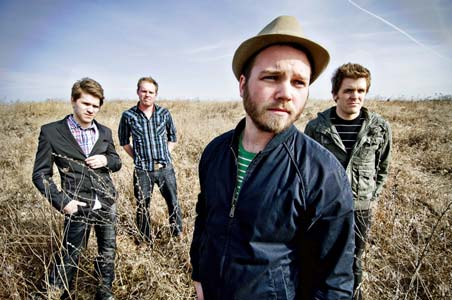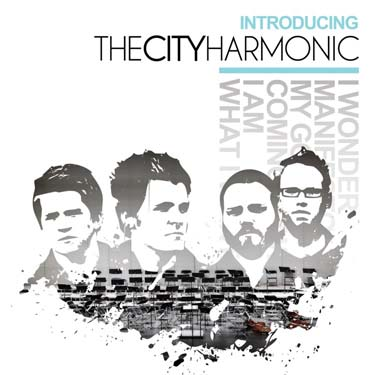|
|
|
The City Harmonic members (l-r) are:
Elias Dummer, vocals/keys; Josh Vanderlaan, drums; Eric Fusilier, vocals/bass; and Aaron Powell vocals/guitar.
What’s In A Name?
By Elias Dummer (Lead Vocals, Keyboards)
It took us 6 months to come up with the name. We wanted a name that conveyed a few ideas well and at the same time captured the big picture of why we do what we do.
So we started out trying to describe the musical thing that we try to do. Even though we’re a rock band it seemed as though a philharmonic was a really good image. So we wanted to play with that word. It translates loosely to “music lovers.” Culturally, it’s usually associated with symphonies and concert halls and orchestras and all that. It’s a word of grandiose pictures. Then you’ve got this idea of a group of people making music together that just doesn’t work without the whole. Almost as though the song just doesn’t sound right without everybody involved. We think about those sweeping orchestral moments in a soaring opera house, that cathedral of sound – in a sense that’s what we want people to feel and to experience and to connect with people in that; to be reminded of the grandeur of Christian reality and its expression in worship.
|
“Worship ought to feel like that – some unveiling of something bigger than ourselves – something we find ourselves in. Otherwise we’re not peeking into eternity so much as wishing we could.” |
The other image we wanted to capture was really just that hopeful tension that ought to be a part of every Christian’s real life – and that is that experientially, the gospel within us isn’t complete in the fullest. C.S. Lewis said this thing that’s always stuck with us: “If I find in myself a desire which no experience in this world can satisfy, the most probable explanation is that I was made for another world.” It’s like there’s this hopeful nostalgia within us for the way things ought to be. It’s almost like deep down we know that in the beginning things were right, and that one day they should be right again. It’s more than wishful thinking – it feels almost tangible. I believe every human being feels this way – it’s just that in Jesus we know what it means.
For me it’s encouraging to know that we don’t just get sucked into some cosmic spiritual reality in some distant universe – God knows this universe needs fixing and has gone about doing it. The author and theologian NT Wright talks about how the Bible is much more concerned about the life after the life after death than it is about heaven. About the new heavens and the new earth – that eventual reality when we’re back to how things were at the beginning in Eden – Christ and His creation fully together again. There’s a lot of mystery there still – but whether we face it or not, that’s our purpose. It feels like maybe we’ve lost sight of that thing – that harmonious city of God, New Jerusalem, Eden 2.0, whatever you call it … it isn’t an afterthought to heaven – it’s the end goal – the way God wants it to be.
So, the name when looked at another way could be read as “The Harmonious City.” I guess that’s why we love some of those old spirituals. The writers had a really good reason to want for a better situation; and if we lose sight of that tension in our songs today we are basically admitting our complacency. So we believe that if we put time into thinking about the way things will be, the way things were, and by being honest about how things are now – that somehow we can spark in people a dream, something they just can’t shake that will inspire them to live like every day matters, and to sing like it matters, and so on.
I guess we’d love our music to bring those two things together – that hopeful nostalgia and to capture in music somehow the feeling of the Christian dream. That feeling of longing, hope and the tension that real life just has built in – and that somehow we find a way to help people to bring those realities to God in meaningful way. If we can do that within our art as a whole, whether it’s within a concert or while listening to an album or whatever – if we can open their eyes to the eventual real world as God sees it, and help them to see themselves in that – their story lining up with God’s story for them and the world – then, for now, we’ve succeeded. Worship ought to feel like that – some unveiling of something bigger than ourselves – something we find ourselves in. Otherwise we’re not peeking into eternity so much as wishing we could.
| www.thecityharmonic.com |

















